Sea Turtle Conservancy (STC) is hoping all of its supporters will participate in this year’s Giving Tuesday Campaign, which seeks to raise funds for the critical work we are doing as part of our Beachfront Lighting Program in Florida. Giving Tuesday, which occurs the Tuesday after Thanksgiving (December 3 this year), is one day when everyone can join together to make a huge difference!
For Giving Tuesday last year, STC supporters raised $61,000 for STC’s in-water research work in the Gulf of Mexico. STC has set its sights even higher this year, with a goal of raising $62,000 for our Beachfront Lighting Program, which we are confident we can reach thanks to generous pledges from STC’s Board of Directors to match up to $36,000 for every dollar donated.
Sea turtles have crawled onto beaches to nest for millions of years. It was once easy for hatchlings to find the ocean after emerging from nests because the brightest horizon was always the ocean, compared to the darkened dune. Now, Florida’s coasts are lined with beachfront properties that can emit powerful, white light, which can cause sea turtles to crawl toward those lights (misorient) or crawl in circles on the beach (disorient).
After the Deepwater Horizon Oil Spill in 2010, STC has received several grants to retrofit problematic lights with sea turtle friendly alternatives on coastal properties in Florida. STC partners directly with coastal property representatives to manage each lighting retrofit project to completion. Since 2010, STC has worked to eliminate problem beachfront lighting and sea turtle disorientations in Florida, retrofitting lights on nearly 350 beachfront properties and darkening more than 46 miles of beach by retrofitting thousands of bulbs and fixtures.
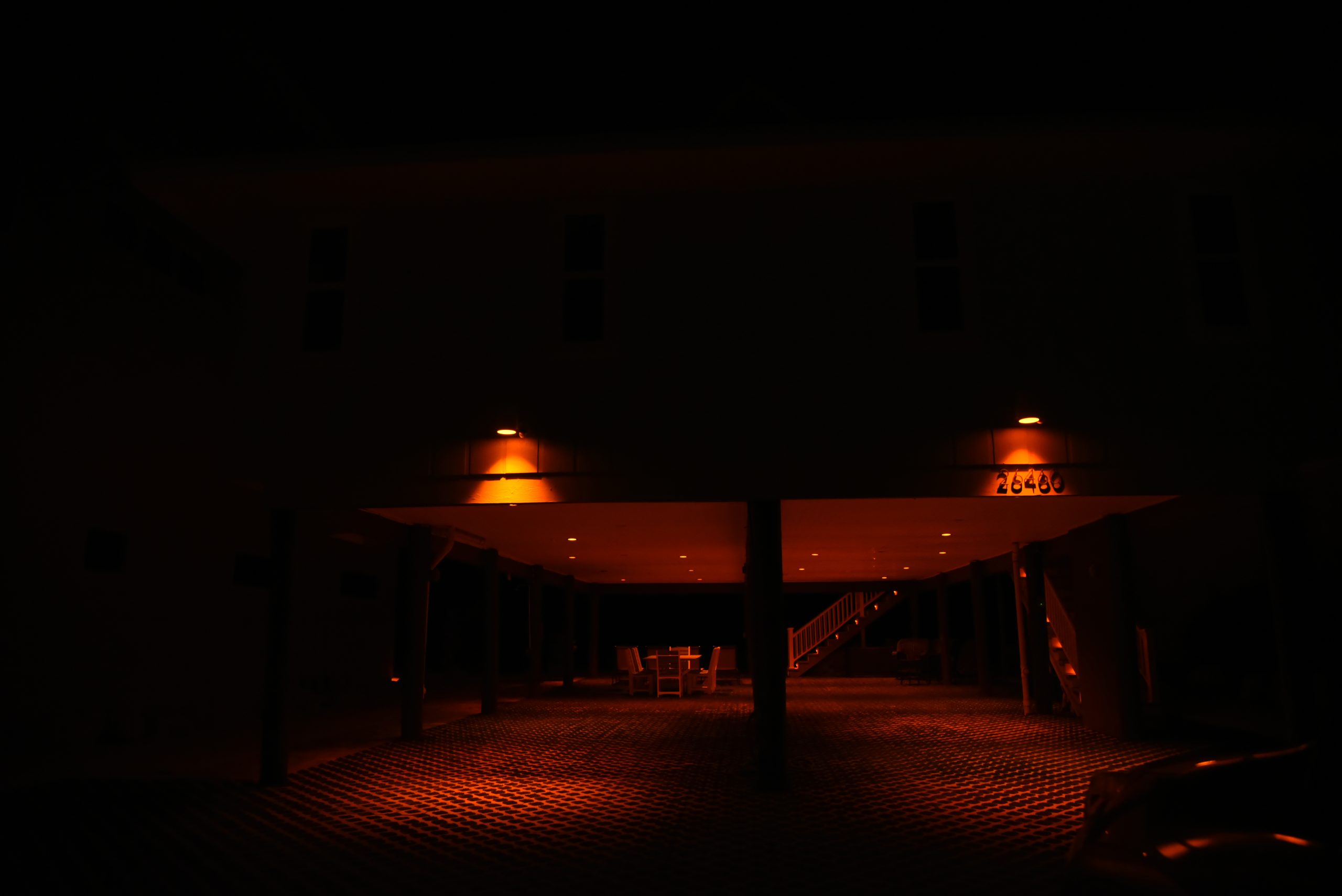
STC is deeply appreciative of all the support received from various foundations for this project. Our current project needs include funding to: host educational workshops, work with local governments in Florida to improve their management strategies for beachfront lighting, and respond to requests from other states and countries to utilize and learn from our 15 years of lighting experience.
We are hopeful that STC’s members will support the program this Giving Tuesday, when all donations will be matched 1:1 by the STC Board of Directors. With your support, STC will continue darkening beaches to make them safe for sea turtles, while also educating the public and important stakeholders on the importance of wildlife-friendly lighting.
Help support STC’s Giving Tuesday Fundraiser by donating:
Funded by a portion of revenues from Florida’s Sea Turtle Specialty License Plate, the Sea Turtle Grants Program distributes funds each year to support sea turtle research, conservation and education programs that benefit Florida sea turtles. In 2024, Sea Turtle Conservancy (STC) had two grants funded, Addressing Barriers to Lighting Compliance Through Targeted Outreach and Inspiring Sea Turtle Conservancy Action Ambassadors.
Addressing Barriers to Lighting Compliance Through Targeted Outreach
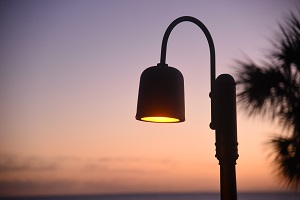 Poorly managed coastal lighting is a leading threat to Florida’s sea turtles. For decades, numerous programs offered by scientists, government agencies, and non-profit organizations have been in place to reduce problematic lighting on Florida’s beaches. However, there is widespread agreement among stakeholders in Florida that more needs to be done to address two barriers to reducing problematic lighting: the inaccessibility of wildlife friendly products and the need to distribute sea turtle conservation messaging through coastal real estate agents. As it stands now, it is largely impossible for a coastal property representative to walk into a home improvement store and purchase wildlife friendly fixtures and lamps; they must be ordered through a lighting distributor that has existing relationships with manufacturers of wildlife friendly lighting. In addition, as more people move to Florida’s coast from out of state, it is crucial that new residents are aware of how to protect the natural resources they are inheriting; one way to reach this audience is by providing educational materials to real estate agents that sell beachfront properties and interact directly with this important audience. Over the past few years, Sea Turtle Conservancy (STC) has begun to address lighting issues with targeted education and outreach. Through this project, STC will refine its home improvement store initiative, and provide the ability to expand STC’s outreach efforts and break down two important barriers to reducing sea turtle disorientations on important sea turtle nesting beaches.
Poorly managed coastal lighting is a leading threat to Florida’s sea turtles. For decades, numerous programs offered by scientists, government agencies, and non-profit organizations have been in place to reduce problematic lighting on Florida’s beaches. However, there is widespread agreement among stakeholders in Florida that more needs to be done to address two barriers to reducing problematic lighting: the inaccessibility of wildlife friendly products and the need to distribute sea turtle conservation messaging through coastal real estate agents. As it stands now, it is largely impossible for a coastal property representative to walk into a home improvement store and purchase wildlife friendly fixtures and lamps; they must be ordered through a lighting distributor that has existing relationships with manufacturers of wildlife friendly lighting. In addition, as more people move to Florida’s coast from out of state, it is crucial that new residents are aware of how to protect the natural resources they are inheriting; one way to reach this audience is by providing educational materials to real estate agents that sell beachfront properties and interact directly with this important audience. Over the past few years, Sea Turtle Conservancy (STC) has begun to address lighting issues with targeted education and outreach. Through this project, STC will refine its home improvement store initiative, and provide the ability to expand STC’s outreach efforts and break down two important barriers to reducing sea turtle disorientations on important sea turtle nesting beaches.
Inspiring Sea Turtle Conservancy Action Ambassadors
The Barrier Island Sanctuary Management and Education Center (BIC) has a responsibility to train the next generation of stewards of sea turtles and their critical nesting habitat. Sea Turtle Academy (STA) field study education programs have reached up to 3,300 students in both Brevard and Indian River Counties with support from the Sea Turtle Grants Program to provide bus scholarships and with funding for a Sea Turtle Educator. Most of these programs reach K-4 students. To broaden the age range of our audience, in 2019, STC also built the Sea Turtle TECH STEM Program to reach middle school and teen audiences during the summer. These programs show strong learning outcomes and pro-sea turtles attitude and conservation behavior shifts. However, the BIC still needs a teen program during the school year. This project will fund a Community Stewardship Coordinator and a college intern to support the STA education program, other sea turtle outreach programs, and the new STCAA program to reach students in the 11-18 year old age range during the school year. With a new Sea Turtle Conservancy Action Ambassador Program, based on the Community Action Projects for the Environment model produced by UF IFAS, we will train teens in the steps needed to succeed in collaborative projects that create systemic change. These projects may be citizen science, advocacy or stewardship oriented and will address threats to sea turtles and their habitats. These programs build the future stewards of the Archie Carr National Wildlife Refuge by training the next generation in the skills needed to conserve sea turtles and their habitats.
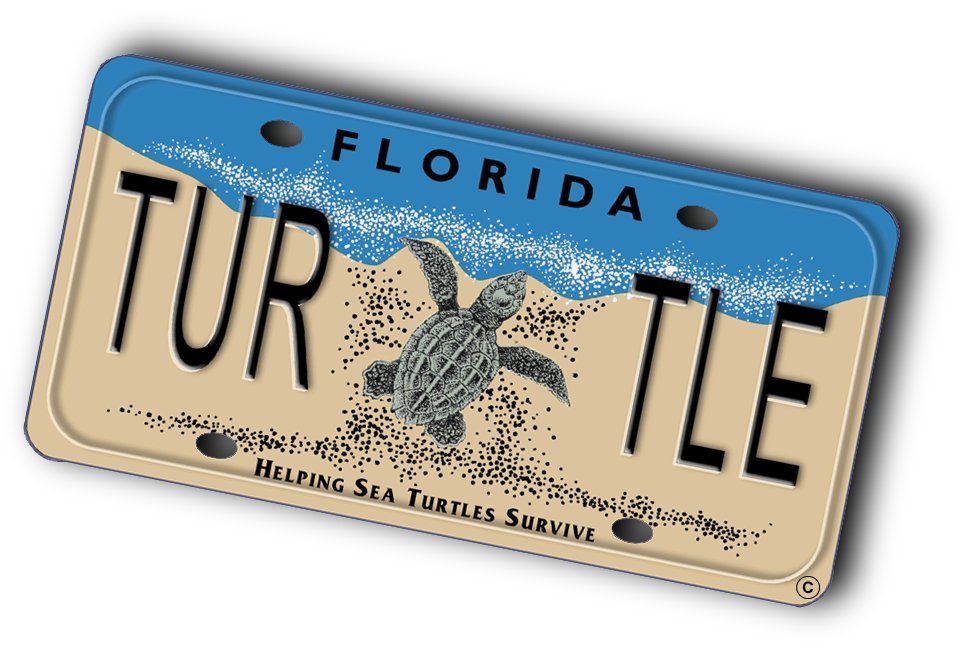 Both projects are funded in whole by a grant awarded from the Sea Turtle Grants Program. The Sea Turtle Grants Program is funded from proceeds from the sale of the Florida Sea Turtle License Plate. Learn more at www.helpingseaturtles.org.
Both projects are funded in whole by a grant awarded from the Sea Turtle Grants Program. The Sea Turtle Grants Program is funded from proceeds from the sale of the Florida Sea Turtle License Plate. Learn more at www.helpingseaturtles.org.

Release dates and information are subject to change. Please check back as we get closer to the event dates! All events listed below are FREE and open to the public. No registration needed!
Loggerhead Turtle Release on Anna Maria Island
Date: June 24 or 25 (release date dependent on turtle nesting)
Location: Anna Maria Island, FL
Release Time: 8:30 am EST
More info on our Facebook Event Page Here!
Green Turtle Releases in Tortuguero, Costa Rica
Date: July 14 & 15
Location: STC Field Station, Tortuguero, Costa Rica
Release Time: 9:00 am CST (local time)
Hawksbill Turtle Releases with The Four Seasons Resort Nevis
Date: July 21, 22
Location: Pinney’s Beach, Nevis
Time: 9:00 am AST (local time)
Loggerhead Turtle Release in the Archie Carr Refuge
Date: Sunday, July 28
Location: Barrier Island Center, 8385 S Hwy A1A, Melbourne Beach, FL 32951
Release Time: 8:30 am EST (arrive by 7:30 am)
Rehab Turtle Release with The Turtle Hospital
Date: Friday, August 2
Location: Sombrero Beach, The Florida Keys
Time: 9:30 am EST
Questions about any of the Tour de Turtles events? Email lexie@conserveturtles.org
Make sure you subscribe to our E-Newsletter below or follow us on Facebook, Instagram and Twitter to receive updated information regarding turtle releases.
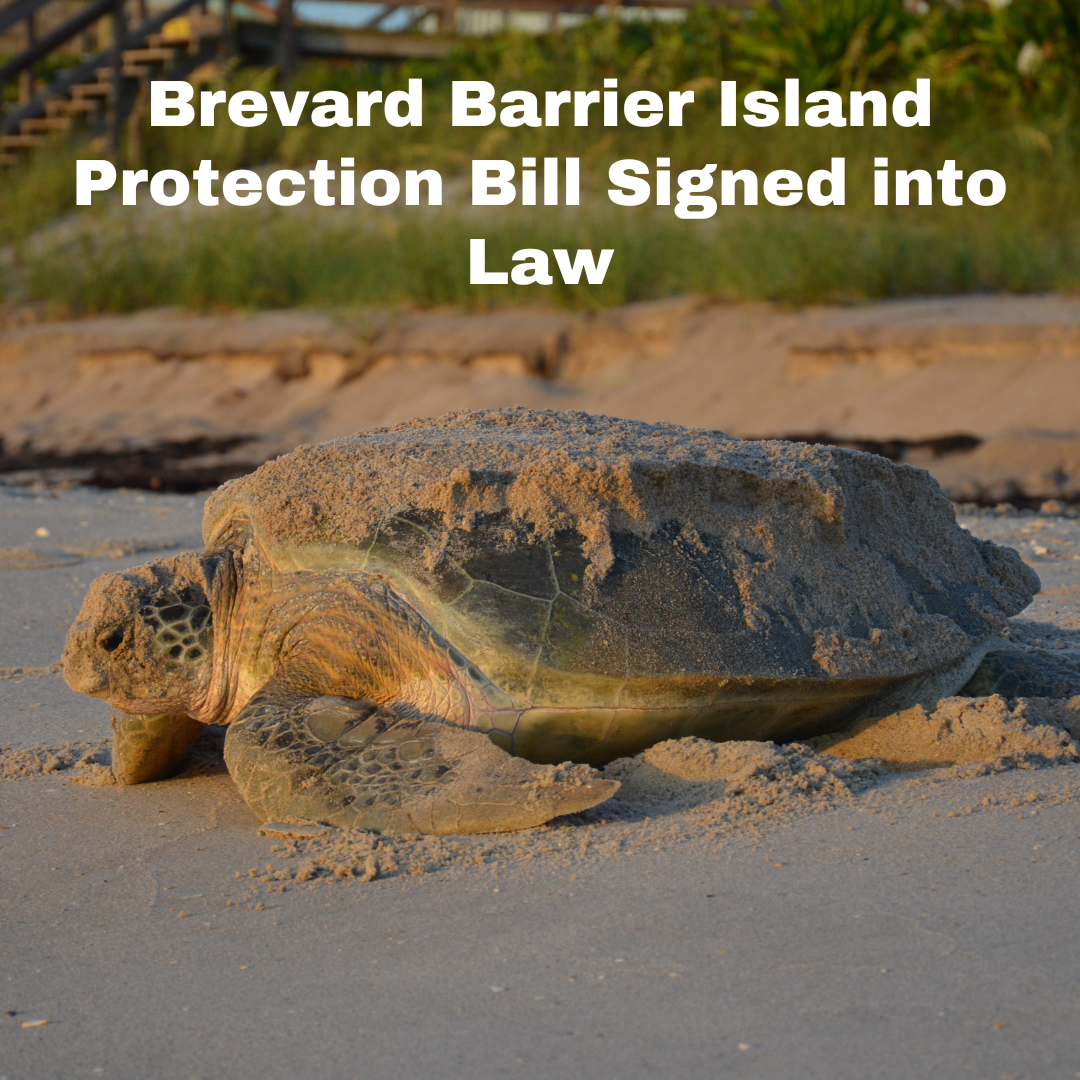 We are thrilled to announce that Florida House Bill 1489, a bill designating the southern area of Brevard County as an Area of Critical State Concern, was signed into law by the Governor yesterday!
We are thrilled to announce that Florida House Bill 1489, a bill designating the southern area of Brevard County as an Area of Critical State Concern, was signed into law by the Governor yesterday!
Brevard County’s south beaches join only five other areas in Florida with this designation, including the Florida Keys, Key West, Big Cypress, the Green Swamp and the Apalachicola Bay area.
This new protection area contains the entirety of the Archie Carr National Wildlife Refuge, a 20.5-mile section of shoreline between Melbourne Beach and Wabasso Beach – the most important sea turtle nesting beach in the United States. It also contains the Indian River Lagoon, an important estuary, recreational fishery, and developmental habitat for sea turtles.
The law requires state, regional, and local government agencies to prevent the adverse impacts of development on resources critical to sea turtle habitat. This includes prohibiting new shoreline hard armoring, reducing nutrient pollution to improve water quality, supporting nature-based solutions to restore habitat, ensuring that development is compatible with the barrier island’s natural resources, and more. Read the full language here.
After learning about efforts to increase development density on Brevard’s South Beaches earlier this year, Sea Turtle Conservancy worked with Barrier Island Protection and Preservation Association (BIPPA), 1000 Friends of Florida, and Brevard County legislators to help draft and advocate for this legislation. At every committee stop, including the full House and Senate, the bill passed unanimously. We believe this was due to the overwhelming feedback legislators received from community members and supporters about the bill.
We thank Representative Thad Altman and Senator Tom Wright for filing this legislation, as well as their staff aides who helped usher the legislation through the process. The bills had strong support from the entire Brevard County legislative delegation. We are also grateful to our conservation partners, legislators, local community members, and our dedicated supporters who helped contribute to this victory for sea turtles!
A major threat to sea turtles is the ingestion of or entanglement with marine debris, including single-use balloons. Although many Floridians participate in balloon releases as part of a celebration or to honor a loved one, once balloons are released, they can travel thousands of miles before landing. When a balloon bursts and lands in the ocean, sea turtles and other marine wildlife often consume it because of its resemblance to jellyfish. Sea turtles are unable to regurgitate, so once the balloon enters the digestive tract, it can cause an impaction that can lead to death.
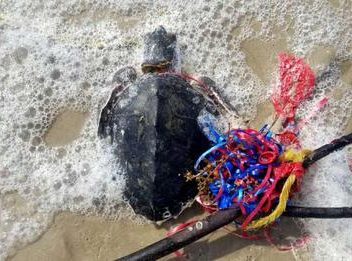
The ribbon attached to balloons also wraps around the flippers or necks of sea turtles, inhibiting breathing, eating or swimming. People who monitor sea turtle nesting around Florida report seeing balloons on nesting beaches on an almost-daily basis. Sea turtle rehabilitation facilities in Florida spend hours removing balloon material and other plastic debris from stranded sea turtles. The Florida Fish and Wildlife Conservation Commission has numerous records of sea turtle deaths associated with balloons.
We are encouraged to see the filing of H.B. 91 – Release of Balloons, which would close a loophole allowing countless balloons to enter our waterways and kill marine life, including sea turtles. Currently, Florida Statute 379.233 prohibits the release of ten or more balloons per day, but makes an exception for “biodegradable” balloons, which is not scientifically sound. By removing these two loopholes, as read in H.B. 91, Florida can drastically reduce plastic debris in the marine environment and save countless marine animals.
All species of sea turtles found in Florida’s coastal and nearshore habitats are listed as either “threatened” or “endangered” under the U.S. Endangered Species Act, meaning that they are at risk of extinction. A number of man-made threats, including coastal development, light pollution, boat strikes, commercial fishing interactions, and plastic pollution are contributing to their decline. While reducing plastic pollution in the ocean as a whole will require systemic change, stopping intentional balloon releases and their debris in the marine environment is achievable through laws such as H.B. 91. By supporting the balloon release ban in Florida in 2023, you can directly improve sea turtle nesting and foraging habitat.
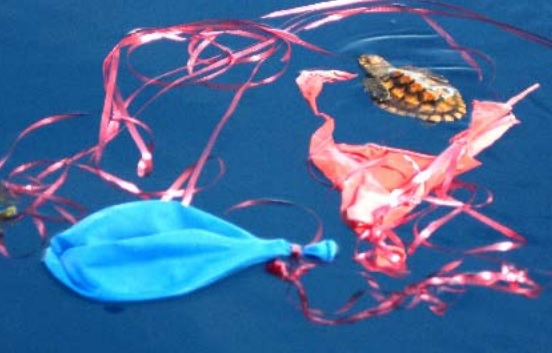
The 2023 Legislative Session begins on March 7 and ends on May 5. To support this legislation, STC encourages Floridians and all sea turtle enthusiasts to contact state House Representatives and Senators and ask them to support H.B. 91, the intentional balloon release ban, when it is scheduled in their committees and up for consideration on the House and Senate floor. While emailing is helpful, directly calling legislators at their district or Tallahassee offices and speaking with their staff is especially impactful. If you are unsure who your legislators are, follow the links below.
Find your Florida Senator: https://www.flsenate.gov/senators/find
Find your Florida House Representative: https://www.myfloridahouse.gov/findyourrepresentative
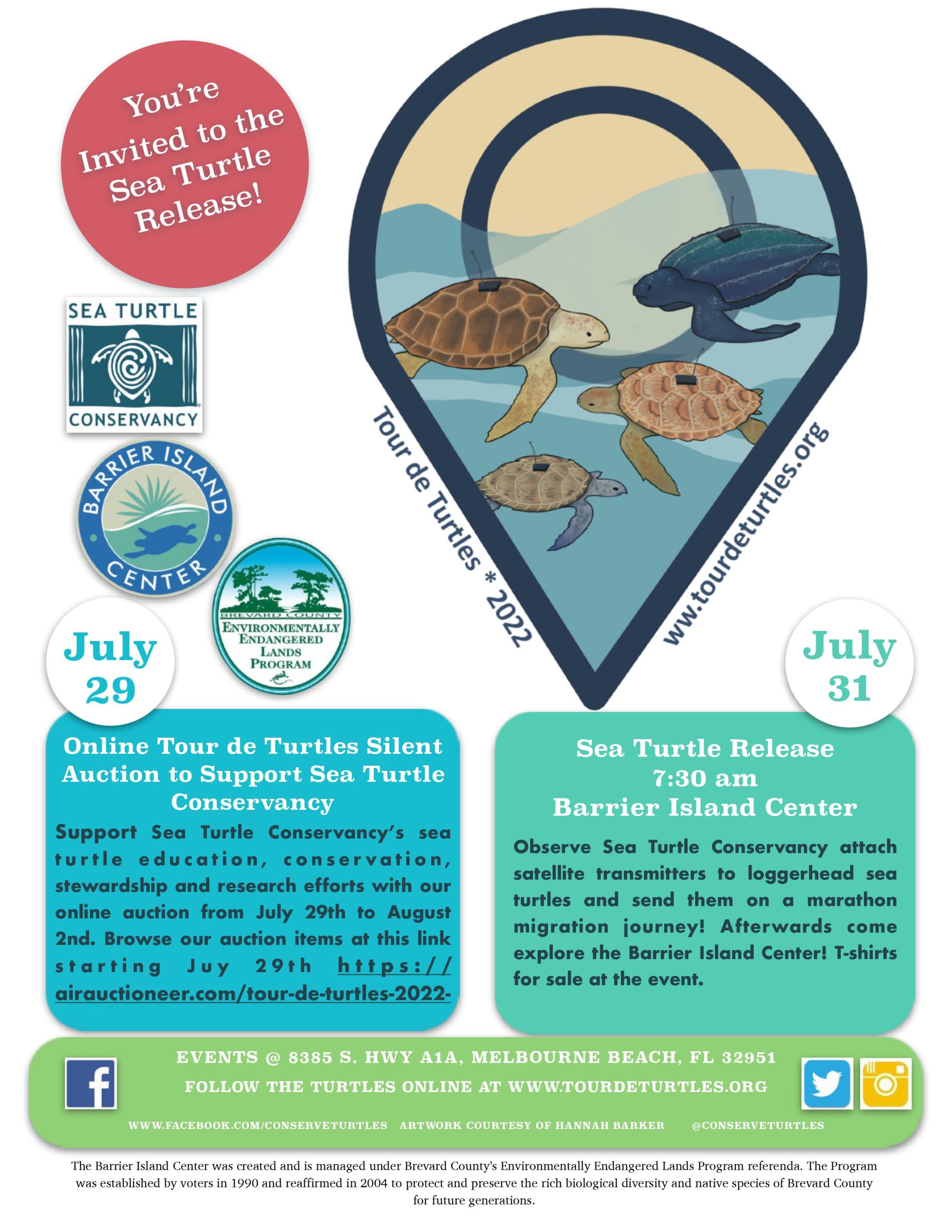
Written by Janet Nupp Hochella, long-time STC member and BIC volunteer. The 30 plus years of efforts on behalf of turtles earned Janet the prestigious Ed Drane Award for Volunteerism at the 2017 International Sea Turtle Society Symposium. Janet now resides in Melbourne, Florida where she can continue to pursue her passion – sea turtles!
—————————————————————————————————————–
From the first year that Guided Sea Turtle Walks were conducted at the Barrier Island Center, I have navigated the dark sandy beach at Bonsteel Park in hopes of finding a nesting loggerhead sea turtle for the guests, young and old, who have assembled from all parts of the state or the country. As a sea turtle walk scout, I never tire from the excitement of meeting new people. But more gratifying is finding a nesting loggerhead sea turtle to show the guests, most who have never seen a sea turtle in the wild, and to share in the guests’ enthusiasm and appreciation of this special reptile.
Guided Sea Turtle Walks offer a unique educational and outreach opportunity for participants. But sometimes, there is an added bonus. The loggerhead sea turtle that the Friday night scouting crew found on their first walk night of the 2021 season on June 4th was a very special sea turtle!
Early into the scouting, while the guests were listening to the educational slide presentation, Turtle South came upon a nesting loggerhead. Scott Beazley and Brandon Garrett radioed to Turtle North, Jenna Coven and me, that they had a small loggerhead digging her egg chamber which would be a good candidate to show the guests. The turtle was not far south of the Bonsteel ramp where the guests access the beach. The Lead, Cindy Pless, was notified and the guests were gathered to get to the beach and to the turtle in time to see the turtle dropping eggs into her egg chamber. This was a small turtle and she was moving right along, but the guests got there in time to see the egg laying process. Always interested in determining whether an observed turtle might have been encountered by the UCF Marine Turtle Research Group and under the FWC permit guidelines, I requested that we check, after the turtle finished camouflaging her nest, for tags – metal tags on one of the scutes of the inner edge of both the left and the right flippers, and most importantly, for a PIT (Passive Integrated Transponder) tag which could be located in any one of the four flippers. Most importantly because the sea turtle can “lose” the metal tags, but the internal tag is usually permanent and can be read with a PIT tag scanner.
Without the use of any light, Scott and I checked for the metal tags. There was none on the left front flipper…but, bingo, there was a flipper tag on the right front flipper! Because I also volunteer with the UCF MTRG and am permitted to check for tags, I grabbed my PIT tag scanner and immediately got a reading from the right front flipper. Finding a PIT tag is always exciting as it reveals there is a history with the turtle. This PIT tag was not in a series that I recognized so finding out the source of the PIT tag would be very intriguing and important. With only the use of the red headlamp to read the flipper tag and the PIT tag, I asked one of the scouts to copy the number to a clipboard that the Lead carries so that I could investigate the source of the tag numbers.
Upon checking with the University of Central Florida Marine Turtle Research Group who monitor and conduct sea turtle research on the Archie Carr National Wildlife Refuge, I was informed that this turtle most definitely had a history. Not only was the turtle seen on the Archie Carr National Refuge by the UCF researchers almost 18 years prior, she was originally encountered by a NOAA group in Florida Bay 21 years ago. I would need to contact Barbara Schroeder, National Sea Turtle Coordinator of NOAA-NMFS, for the particulars.
After several attempts through various channels, I was able to connect with Barbara Schroeder. I was thrilled to learn that the turtle we encountered was one that Barbara Schroeder herself has researched and documented over many years as part of the FFWCC/NOAA Florida Bay Sea Turtle Project.
(Photos courtesy of Barbara Schroeder, FWC/NOAA Sea Turtle Bay Project)
This small loggerhead has quite a backstory! Barbara Schroeder writes in an email “this turtle was first captured by us in Florida Bay in 2000, she was an adult then (you can see her length has not changed). In March 2013 we satellite tagged this turtle after ultrasound revealed she was preparing to breed that summer and she was seen nesting at ACNWR in June 2013 and of course her satellite tag data showed us the same. We named her “Shiver” as it was very cold in March 2013 when we captured her.” Summary records that Barbara Schroeder sent along in the email show that the turtle has been recorded as seen nesting on the Archie Carr National Wildlife Refuge in 2016, 2018, and now in 2021.
Shiver is a special turtle study with her history of being recaptured multiple times in Florida Bay and on the Archie Carr Refuge in multiple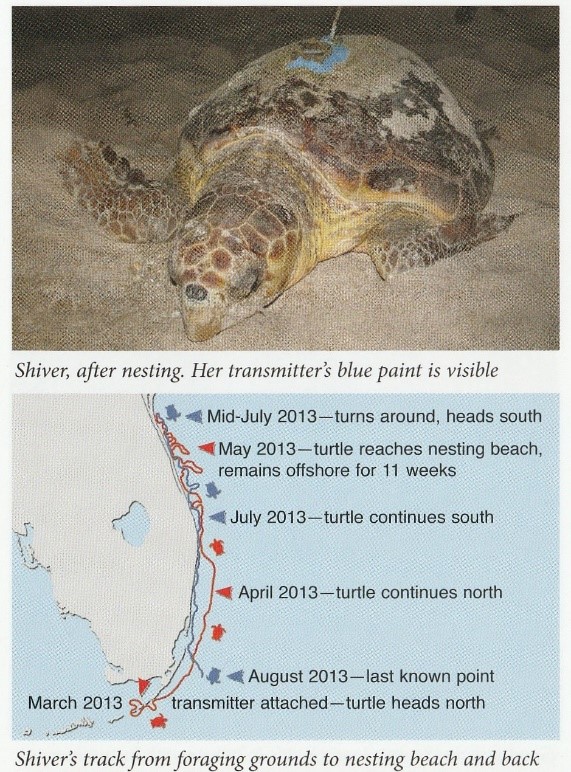 years. Shiver gained celebrity status with her own write up in Blair E. Witherington’s book Our Sea Turtles published by Pineapple Press in 2015. Dr. Witherington used Shiver’s data, provided by the FFWCC/NOAA Florida Bay Sea Turtle Project, to exemplify the reproductive migrations of sea turtles. In his book on page 123, Witherington writes “To track her movements over her upcoming nesting season, the researchers attached a satellite transmitter to Shiver’s carapace. Her broadcasts indicated that she left Florida Bay to enter the Atlantic in mid-April and moved along the Florida coast to the Archie Carr National Wildlife Refuge, covering the roughly 250 miles (400 km) trip in about two weeks. Shiver lingered off the refuge and deposited several clutches over an 11-week period. Not long after her last nest, Shiver set off for home, nearly reaching her home waters of Florida Bay after a three-week swim.” The photo to to the right, taken from the book, shows a photo of Shiver and her migratory path in 2013.
years. Shiver gained celebrity status with her own write up in Blair E. Witherington’s book Our Sea Turtles published by Pineapple Press in 2015. Dr. Witherington used Shiver’s data, provided by the FFWCC/NOAA Florida Bay Sea Turtle Project, to exemplify the reproductive migrations of sea turtles. In his book on page 123, Witherington writes “To track her movements over her upcoming nesting season, the researchers attached a satellite transmitter to Shiver’s carapace. Her broadcasts indicated that she left Florida Bay to enter the Atlantic in mid-April and moved along the Florida coast to the Archie Carr National Wildlife Refuge, covering the roughly 250 miles (400 km) trip in about two weeks. Shiver lingered off the refuge and deposited several clutches over an 11-week period. Not long after her last nest, Shiver set off for home, nearly reaching her home waters of Florida Bay after a three-week swim.” The photo to to the right, taken from the book, shows a photo of Shiver and her migratory path in 2013.
As sea turtles generally nest every two years, Shiver probably won’t be encountered on her nesting beach this year. Finding her again in the 2023 Sea Turtle Nesting Season would truly be a stroke of luck with the hundreds of loggerheads that nest multiple times every season on the Archie Carr National Wildlife Refuge. But the Sea Turtle Conservancy Barrier Island Center Sea Turtle Scouts will be out there again this 2022 season. Who knows what sea turtle we will encounter on our guided sea turtle walk night. All of the sea turtles are special! Like Shiver!
Further information on Referenced Organizations:
Archie Carr National Wildlife Refuge – https://conserveturtles.org/archie-carr-national-wildlife-refuge-refuge-sea-turtles/
FWC – https://myfwc.com/research/wildlife/sea-turtles/research/fl-bay-population-study/
NOAA – https://www.fisheries.noaa.gov/sea-turtles
Sea Turtle Conservancy Barrier Island Sanctuary – https://conserveturtles.org/barrier-island-education-center/
University of Central Florida Marine Turtle Research Group – https://sciences.ucf.edu/biology/marineturtleresearchgroup/?fbclid=IwAR32HUqbqY0RdEe2pcZeTN3Zk3meCYavHVvAvxq7v5mLmQmaKEl_1JU_Qow
Sea Turtle Conservancy (STC) recently kicked off its 13th annual Tour de Turtles migration marathon! The Tour de Turtles is a fun, educational journey that follows the migration of sea turtles from their nesting beaches to their foraging grounds. Through the use of satellite telemetry, STC will track 15 sea turtles, including leatherbacks, loggerheads, greens and one hybrid green/hawksbill, to determine how far they swim. The one to swim the furthest distance by October 31 “wins.”
Each turtle is also swimming to raise awareness about the threats sea turtles face. These threats include light pollution, beach erosion, marine debris, oil spills, commercial fisheries, illegal hunting, invasive species predation, climate change and more. The data collected during the Tour de Turtles helps researchers, conservationists and governing agencies make more informed decisions about sea turtle conservation methods and policies. Since the launch of the Tour de Turtles in 2008, STC has tracked more than 200 turtles.
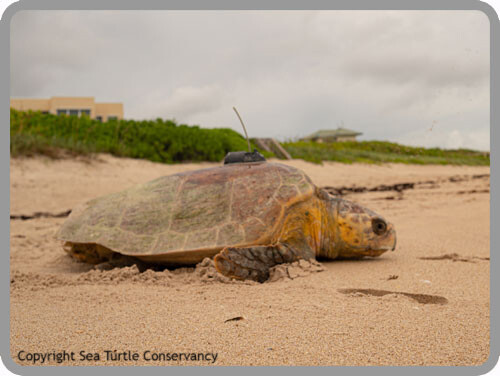
This year’s Tour de Turtles is special for several reasons… For the first time ever, it is comprised entirely of turtles from Florida. This is also the first time STC has tracked leatherbacks from Florida, thanks to a partnership with Florida Leatherbacks, Inc. Typically the organization travels to Panama, Costa Rica, Cuba, Nevis and other international sites to satellite tag turtles but was limited to Florida due to COVID-19.
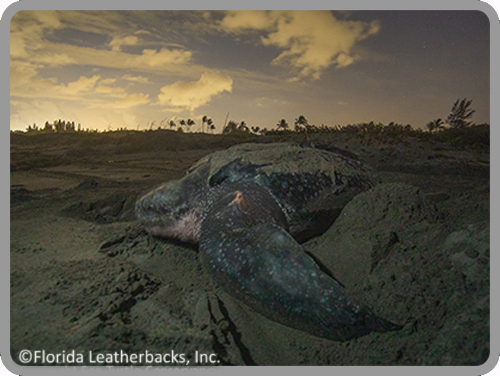
You can support the turtles by “adopting” them or sharing on social media to help raise awareness! Learn more about the turtles and follow their migrations at www.tourdeturtles.org. You can also purchase a Tour de Turtles 2020 t-shirt by clicking here or below!
The Sea Turtle Grants Program (STGP), funded by the sale of Florida’s “Helping Sea Turtles Survive” specialty license plate, recently awarded $340,439.60 to 20 different projects benefiting Florida sea turtles as part of the 2020-2021 grant funding cycle.

Each year, the Sea Turtle Grants Program distributes money to coastal county governments, educational and research institutions and nonprofit groups through a competitive application process. The sea turtle specialty license plate is also the primary source of funding for the Florida Fish and Wildlife Conservation Commission’s Marine Turtle Protection Program.
The following organizations received grants for their approved projects for the 2020-2021 cycle:
The sea turtle plate is the number two overall selling specialty tag in Florida, and the number one environmental specialty plate. By purchasing the sea turtle specialty license plate, Floridians are voluntarily funding important programs to save endangered sea turtles and their habitats.
To learn more about the Sea Turtle Grants Program and the “Helping Sea Turtles Survive” specialty license plate, please visit www.helpingseaturtles.org.
**UPDATE: Unfortunately, the public lost the vote, 3-2. Thank you to everyone who sent emails, made calls and attended the meeting. 15 people spoke for the changes, and 1 developer spoke against them. If nature and conservation groups unite to make changes to the local government, we have a chance of preserving a legacy for future generations….otherwise, it will only get worse, and all the work we’ve done will be for naught. “They paved paradise, put up a parking lot” as Joni Mitchell sang in 1970.**
———-
There is a rare opportunity to reduce the impact of a highly destructive “loophole” in Brevard’s laws governing Specimen and Heritage trees at an upcoming commission meeting.
Before It’s Too Late! Let’s Save Brevard’s Remaining HERITAGE and SPECIMEN Trees
Why would Brevard County adopt a thorough, 28-page Land Clearing and Tree Protection Policy and include a single sentence, in Section 62-4334, that EXEMPTS 299,508 properties (90%) from following the policy? The result is that a large part of our county’s tree canopy (any property less than one and one-quarter acres), including heritage and specimen trees, can be clear cut at the whim of owners. Think about that for a minute…
Towering 100-year-old Live Oaks, Pin Oaks and Scrub Oaks are being cut down every day. 50-foot tall Sea Grapes, Coconut Palms, Bottle Palms, Royal Palms, Washingtonians and any other trees can be cut down for any reason, or no reason at all, under Brevard county law … No Permits Required!

This Brevard Co. property clear cut and replaced native trees with grass and pavers, which will now funnel even small amounts of rain and flooding first to A1A, and then the Indian River Lagoon.
After extensive discussions with Brevard County Commissioners and Natural Resources staff about the best means to reduce this destruction, the Commissioners will be voting Tuesday, March 10, on a “Legislative Intent” to amend the Specimen tree ordinance. This amendment reduces the exempt properties from 1 ¼ acres to 1/4 acres and achieves the following:


Sea Turtle Conservancy strongly supports this proposed revision to Brevard County’s tree ordinance, which would remove an exemption that allows many beachfront property owners to indiscriminately chop down large coastal scrub oaks, mature sea grape trees and other large coastal trees that play a critical role in stabilizing dune habitat and minimizing erosion following storms. The coastal vegetation to be protected by this new ordinance also helps shield important sea turtle nesting sites from artificial light coming from beachfront developments. In short, this revised ordinance will help protect some of the most important sea turtle nesting habitat in the world from the reckless removal and clear-cutting of coastal vegetation – a practice that worsens the rate of coastal erosion, especially in a time of increased storm activity and sea level rise associated with climate change, and exposes sea turtles and their hatchlings to greater levels of light pollution.
Meeting Date: Tuesday, March 10 @ 5pm
Location: Brevard County Gov’t Center, 2725 Judge Fran Jamieson Way, Bldg C, Viera


E-mails are very important if you are unable to attend the meeting. You do NOT have to be a resident of Brevard County to speak up about this issue. Please pick any or all of the 7 items above as the basis of and e-mail to all 5 Commissioners:
I Support an Amendment to reduce to 1/4 acres, or eliminate, the exemption on the cutting of our trees in Section 62-4334 of Brevard Code.
E-Mail to: d1.commissioner@brevardcounty.us for Rita Prichett 321-607-6901
d2.commissioner@brevardcounty.us for Brian Lober 321-454-6601
d3.commissioner@brevardcounty.us for John Tobia 321-633-2075
d4.commissioner@brevardcounty.us for Curt Smith 321-633-2044
d5.commissioner@brevardcounty.us for Kristine Isnardi 321-253-6611
Together we can make this happen!
Overview and Purpose
Sea Turtle Conservancy (STC) is based in Gainesville, Florida, and was founded by renowned sea turtle expert Dr. Archie Carr. STC is the oldest and one of the most accomplished sea turtle conservation organizations in the world. STC is hiring a Senior Accountant to assist the STC Controller in managing and accounting for projects in the US, Costa Rica, Panama, and the Caribbean.
Duties and Responsibilities
This position is full time, based in our Gainesville, Florida office. Accounting tasks will be many and varied, under the direct supervision of the Controller. They will include:
Minimum Qualifications
Salary and Benefits
Applications will be accepted until a candidate is selected. Apply by submitting your cover letter and resume to the Controller, Pat McCloskey, at pat@conserveturtles.org.
**POSITION FILLED**
Overview and Purpose
Sea Turtle Conservancy (STC) is based in Gainesville, Florida, and was founded by renowned sea turtle expert Dr. Archie Carr. STC is the oldest and one of the most accomplished sea turtle conservation organizations in the world. STC is hiring a Lighting Project Specialist to work on our Sea Turtle Lighting Project. This person will work as part of our lighting team implementing sea turtle lighting retrofits on beachfront properties in Florida, assisting with educational workshops, and coordinating dune planting projects to help further reduce lighting impacts to nesting turtles. The National Fish and Wildlife Foundation has funded STC’s lighting project as part of its investment toward mitigating the impacts to sea turtles caused by the 2010 Deepwater Horizon Oil Spill. The project’s goal is to increase sea turtle survivorship by reducing hatchling disorientation caused by lighting. The project works with private property owners to retrofit problematic beachfront lighting to sea turtle friendly alternatives using the best available technology.
Duties and Responsibilities
The primary responsibilities of this position will be implementing sea turtle lighting retrofits and dune planting projects in the south west Florida peninsula. The position will involve collection of night-time photos and lighting measurements; contract negotiations with property owners and managers; developing exterior lighting plans; communicating with property owners and lighting distributors; and data entry, management, analysis and mapping using Access, Excel and ArcGIS Online. Travel to the south west Florida peninsula and other parts of the state over 3 to 5 day periods will be required. Duties also will include coordinating travel logistics; tracking the progression of multiple projects in various stages; and conducting lighting workshops developed for code enforcement and building professionals. The position will require flexible work hours, occasionally at night and on the weekends. The Lighting Project Specialist will be based in Gainesville and work directly under the Lighting Project Manager as part of a four-person team of lighting specialists.
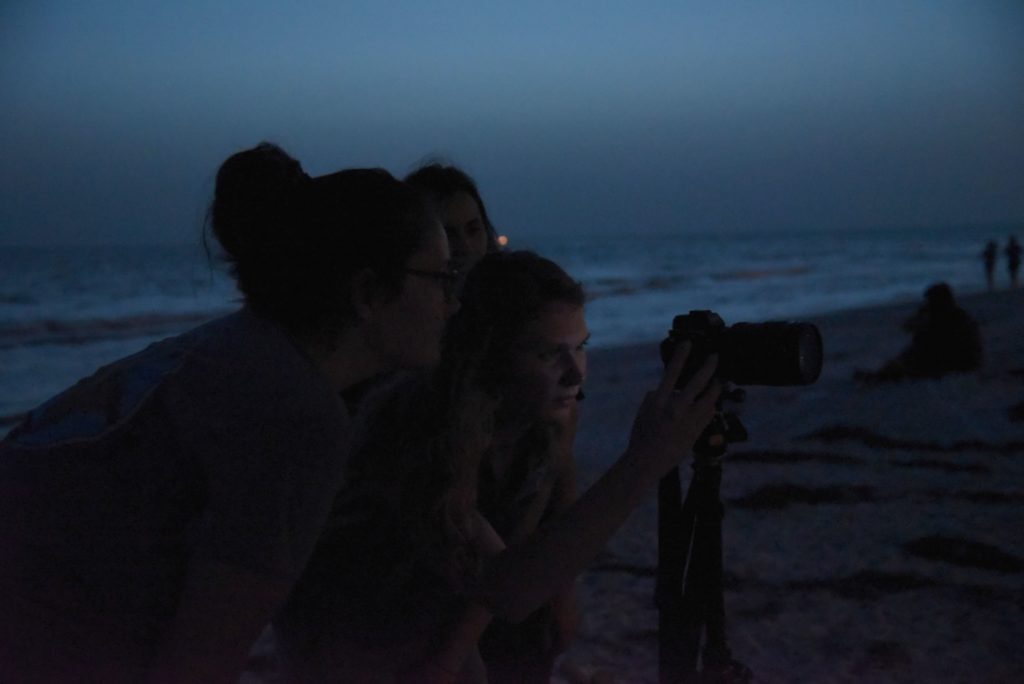
Minimum Qualifications


Salary and Benefits
Applications will be accepted until a candidate is selected. A start date prior to the end of 2019 is preferred. Apply by submitting your cover letter and résumé to the Project Manager at Rachel@conserveturtles.org.
Funded by a portion of revenues from Florida’s Sea Turtle Specialty License Plate, the Sea Turtle Grants Program distributes funds each year to support sea turtle research, conservation and education programs that benefit Florida sea turtles. In 2019, Sea Turtle Conservancy had two project proposals selected for funding.
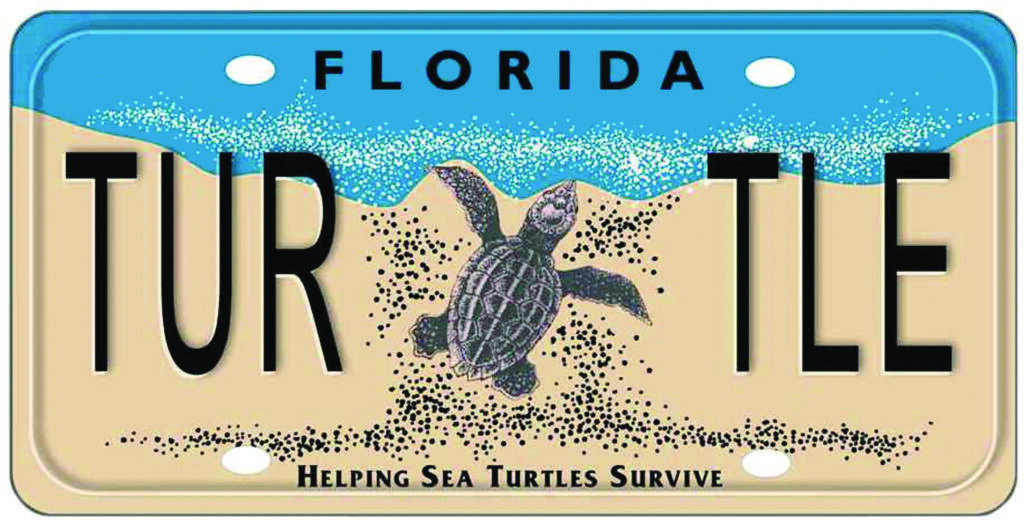
2019
Green Turtle Seasonal Movements and Group Behavior in Florida’s Big Bend – $27,600.00 awarded
In the Florida Keys, green turtles have showed signs of herding or coordinated movements over seagrass habitat. It’s possible this also occurs in the Big Bend during warmer months (May–September), however, it’s unclear how frequent juvenile green turtles actually associate with each other. This project will use telemetry to determine migratory movements of juvenile green turtles due to changes in water temperatures and investigate localized group behavior during the spring, summer and fall. ARGOS satellite transmitters will be placed on juvenile green turtles that are captured at four different sites in the Big Bend. Their movement patterns will be analyzed using state-space models and ArcGIS spatial analysis tools. The results will help explain large scale seasonal movements as well as small scale group behavior that may be impacted in the future by climate change and the loss of habitat.

FWC Permit #118
Upgrading Sea Turtle Lighting Education Program – $18,930.00 awarded
Sea Turtle Conservancy (STC) will refurbish and update the traveling lighting displays funded by the grants program in 2014. Since their creation, the displays have successfully been hosted at facilities throughout the state of Florida and have been viewed by hundreds of thousands of people. The four portable displays have received considerable wear since they were first created and deployed. STC will work with the original graphics company to reprint the panel graphics; add a protective coating on each panel to prevent scratching; and repair and update damaged and outdated fixtures. Once the displays are repaired, STC will re-deploy them in high-traffic locations in southwest Florida, where STC will expand its separately-funded sea turtle lighting retrofit program. STC will also work with a video production company to create a short instructive video to further educate beachfront property owners about the importance of sea turtle lighting and how to be part of the solution. This video will be broadcast to targeted audiences in SW Florida through boosted social media postings.

To learn more about the Sea Turtle Grants program, visit www.helpingseaturtles.org.

Photo credit: Rachel Smith
Nesting season officially kicked off on May 1st in Florida, where about 90% of sea turtle nesting in the U.S. takes place. Whether you are a Florida resident or are simply stopping by for summer vacation, this information will help you get the most out of our beautiful beaches while also being considerate of nesting sea turtles and hatchlings. Share this information with your beach-loving family and friends to ensure that our beaches can be safely and responsibly enjoyed by all!
Human threats that can interfere with the nesting and hatching process include:
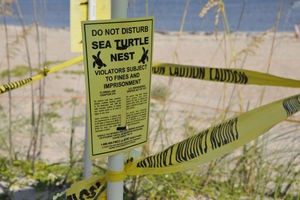 Sandcastles: knock them down! The flatter the beaches are, the easier it will be for nesting sea turtles and hatchlings to safely make it to and from the water. We know you worked very hard on your masterpiece and are sorry to see it go, but the turtles appreciate it.
Sandcastles: knock them down! The flatter the beaches are, the easier it will be for nesting sea turtles and hatchlings to safely make it to and from the water. We know you worked very hard on your masterpiece and are sorry to see it go, but the turtles appreciate it.Want a chance to see a nesting loggerhead sea turtle? Attend a Turtle Walk! STC’s Turtle Walks take place in the Archie Carr National Wildlife Refuge, starting at the Barrier Island Center in Melbourne Beach, FL. Participants have the chance to witness a nesting loggerhead sea turtle. Walks are conducted by STC on Monday, Tuesday, Thursday, and Friday nights in June and July. Space is limited to 20 people per night. Cost is $15 per person. Click here to reserve your spot!
Single-use plastics pose a threat to all marine life, but especially to sea turtles. Researchers from the University of Exeter recently found single use plastics and fibers in the gut of all 102 sea turtles they sampled in 2018. Without a major global effort to reduce the consumption of single-use plastics, there could be more plastic in the ocean than fish by 2050.
After a video of a sea turtle with a straw in its nose went viral in 2015, a global plastic-free movement has been gaining momentum. Corporations such as Starbucks, McDonald’s, Delta Airlines, and Marriott recently announced changes to their plastic policies to protect marine life. In Florida, Sea Turtle Conservancy works with coastal restaurants to change their straw policies and to empower their guests to make conservation-minded decisions. Local governments in Florida are also introducing restrictions on plastic bags and single-use cutlery.
This effort may be in jeopardy. Florida Senator Hutson filed a bill in January, Senate Bill 588, which seeks to stop local governments from passing laws to reduce plastic consumption in their communities. In particular, the bill will invalidate all existing straw bans in Florida and will prevent local governments from banning straws in the future. This bill, disguised as an effort to reduce plastic consumption, will freeze the efforts of local governments to make decisions about their own neighborhoods. You can read the bill in full by clicking here. Check out this recent article from the Tampa Bay Times for more on the issue.
Sea Turtle Conservancy does NOT support SB-588 because we SUPPORT bans of plastic bags, cutlery, Styrofoam and straws to reduce potential harm of sea turtles by marine debris. Sea Turtle Conservancy does support House Bill 6033, filed by Representative Grieco and co-sponsored by Representative Eskamani, which proposes to restore the ability for local governments to ban plastic bags.
We need your help! On Monday, March 4 at 1 p.m., members of the Florida Senate’s Commerce and Tourism committee will vote on Senate Bill 588. Please let committee members know your feelings about this bill by emailing or calling them using the contact information below.
Personalized comments are the most effective, especially if any of these committee members are in your district in Florida. Here is a short example of what you can say:
“My name is _____ and I ask that you vote “No” on Senate Bill 588. I oppose Senate Bill 588 because plastic debris kills wildlife every year, including endangered sea turtles. Straw bans are an effective way to reduce plastic consumption and protect marine life from possible plastic ingestion. There is a global movement to reduce plastic use at the local, state and federal level. Senate Bill 588 will freeze that progress and prevent local governments from making decisions that impact their own communities.”
Senator Travis Hutson (bill sponsor)
(850) 487-5007
hutson.travis@flsenate.gov
Senator Victor Torres
(850) 487-5015
torres.victor@flsenate.gov
Senator Joe Gruters
(850) 487-5023
gruters.joe@flsenate.gov
Senator Linda Stewart
(850) 487-5013
stewart.linda@flsenate.gov
Senator Tom Wright
(850) 487-5014
wright.tom@flsenate.gov
STC’s Executive Director David Godfrey was recently interviewed by NBC Nightly News to discuss the importance of sea turtle friendly lighting in Florida, which STC has played a major role in implementing across the state. The story aired live on September 22, 2018 and can be viewed on NBC’s website by clicking the image below: